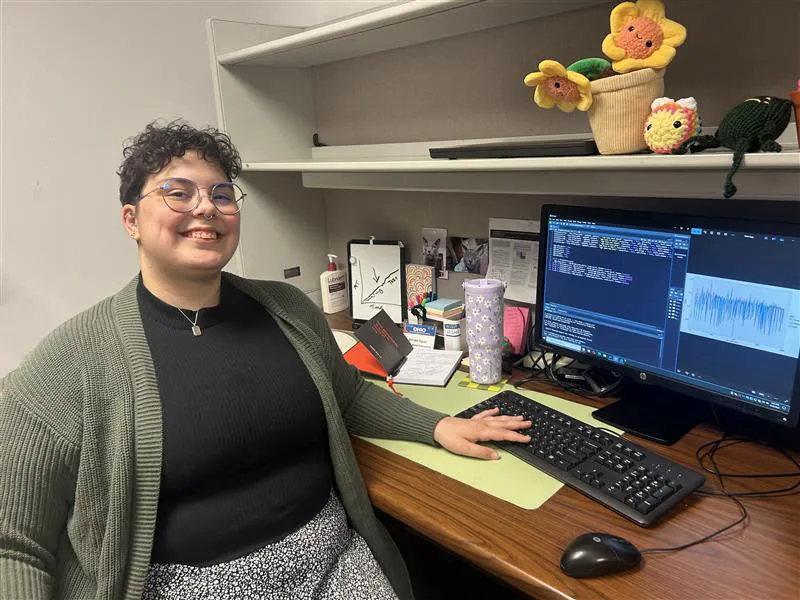Using time series analysis and machine learning for psychology
Meet Vivian Egan
As a child, Vivian Egan didn’t know much about the numerous ways that science, technology, engineering and math (STEM) branched out into the world. But soon enough she developed a fascination with math, science and the human body, and that interest would lead her to eagerly learn more. She took every science class that she could during high school and originally thought that she would become a medical doctor, though her interests would take her down a different path.

Vivian Egan, a former ORISE participant at the Air Force Research Laboratory, looked at comparing and combining traditional data analysis methods with newer machine learning techniques. (Photo credit: Vivian Egan)
Egan started as a biology and premed major for her undergraduate degree, though she eventually switched to psychology. Egan earned her bachelor’s degree in psychology, master’s degree in industrial and human factors engineering and will complete her doctoral degree in engineering with a focus on industrial and human factors in August 2025, all from Wright State University.
Cognitive neuroscience was her favorite class while earning her bachelor’s and led to research experience with the course’s instructor. This early lab experience taught her just how much she loved the research aspect of science. That love of research was on the forefront of her mind when she found and applied to the Oak Ridge Institute for Science and Education (ORISE) Human-Centered Interface Design Fellowship at the Air Force Research Laboratory (AFRL). It reminded her of the courses she took during her undergraduate degree.
The AFRL Research Participation Program provides opportunities for students, postgraduates, established scientists and faculty to participate in programs, projects and activities at DoD facilities. The 711th Human Performance Wing (711 HPW), headquartered at Wright-Patterson Air Force Base in Ohio, is the first human-centric warfare wing to consolidate human performance research, education and consultation under a single organization.
Under the guidance of her mentor, Elizabeth Fox, Egan eagerly started preparing a research project.
“The main project I focused on was using time series analysis with two different human behavioral datasets that were collected,” explained Egan. “Time series analysis has two uses, to help model and understand underlying trends in a dataset or to forecast future values by learning from previous values.”
Time series analysis evaluates patterns over time in a set of data. Egan looked at using this tool for psychology, specifically data collected about multitasking in the workplace. Additionally, she compared traditional models to a machine learning model to see which of the two were more accurate with their predictions. Machine learning can help pick up the slack where a traditional time series model falls short, due to the incredibly variable nature of human behavioral data. By learning from traditional methods and machine learning models and continuing to improve them for increased prediction accuracy in human multitasking performance, one could increase a person’s “satisfaction, comfort and efficiency potentially” within the systems and technology around us, says Egan.
Egan learned a lot during her internship. She thanked her mentor for being a positive influence, giving her tools to achieve her goals and grow as a person. Before, Egan struggled with large project planning but feels much more comfortable breaking down large projects into smaller pieces after her internship. Her favorite parts of the internship were collaborating with other scientists and independently seeking out her areas of interest. She recommended the program to others.
“I would not have been able to get to where I currently am without this appointment. I feel as though my mentor provided exceptional mentorship that aided me in moving forward in my educational and professional career as well as life in general at times,” said Egan. “I couldn’t imagine the last three years of my life without this program!”
Now, Egan’s goal is to finish her doctoral degree. Until then, she has been helping author papers and is approved for the Defense Associated Graduate Student Inventors Fellowship Award, which she plans to use on continuing similar research with human performance.
AFRL’s Research Participation Program is funded by the U.S. Air Force and administered through the U.S. Department of Energy’s (DOE) Oak Ridge Institute for Science and Education (ORISE). ORISE is managed for DOE by ORAU.

